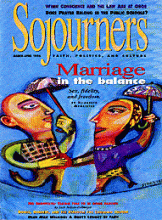We live in a historic moment which makes it plain that the negative power of speech can be translated directly into negative actions. (The assassination of Israeli Prime Minister Rabin and the Brookline, Massachusetts, abortion clinic shootings stand out.) What we say can lead people to act in ways that are sometimes harmful to others. While we cannot be held directly responsible for these actions, we do have a responsibility to self-monitor and self-govern our speech, always keeping in mind the potential implications of our speech-acts.
"Responsible speech," while still the predominant form of speech, is quickly losing ground to another form. Today a new wave of conservative books and articles, taking aim at what the authors of these works term the "liberal agenda," is increasingly challenging "responsible speech" for predominance.
Dinesh D'Souza's The End of Racism is the latest installment in this conservative media campaign using a rhetorical form of speech. In a very tense racial environment, D'Souza claims: "If all welfare recipients were white, most liberals would probably support legal measures that make benefits contingent upon responsible behavior. But since a disproportionate number of welfare mothers are black, many liberals are ideologically compelled to resist any serious proposals that link benefits to work or responsibility."
This comment crosses the line of responsible speech. More than the fact that it is irresponsible, it is misleading. The African-American and liberal communities are not closely tied, as D'Souza leads his readers to think. The African-American and liberal communities share a functional union, not an ideological one. D'Souza misses the dynamic, sometimes confrontational, relationship of these communities. Factoring out agreements on racial and economic justice, the two communities share few other beliefs. The depth of "cultural conservatism" in the African-American community, which separates
Read the Full Article
